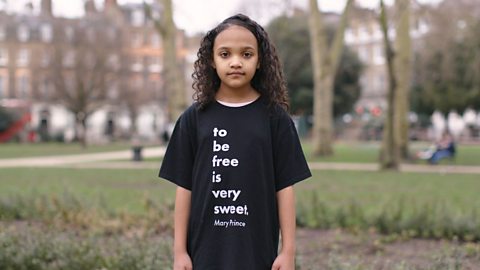DONTAY:Hi, my name is Dontay and I'm nine years old. People from all around the world have been coming to Britain to make it their homes for hundreds of years. But in the 1940s, 50s and 60s, there was a huge increase in the number of people arriving from the Caribbean islands. They were invited to come here by the British Government because there was a shortage of people to do some important jobs. These people are often called the Windrush Generation because the boat that brought the first new arrivals was called the HMT Empire Windrush. The boat arrived at Tilbury Docks, Essex, 22nd of June 1948. Alison Bennison arrived in 1960 after she answered an advert looking for nurses to join the NHS. The National Health Service was new back then; it was formed just over 10 years before Alison's arrival. She was living on the Caribbean island of Barbados when she saw the advert. I'm meeting with her granddaughter Lindsey, to tell me more about her journey.
Thank you for meeting me today, Lindsey.
LINDSEY:It's my pleasure. Thanks for being interested in my grandma's story.
It was my grandma's Aunt Lil, who pushed her when she saw the advert calling for nurses from overseas. If it wasn't for her, there was no way my grandma would have made such a huge journey. But Aunt Lil wanted her to make the most of her intelligence and use it to help people. My grandma's mother passed away when my grandma was just a girl. She was only 14. She died giving birth. This experience made her think about going into medicine as a career.
DONTAY:So how old was your grandma when she came to Britain?
LINDSEY:My grandma was only 19, which was so young to be starting a whole new life in a new country. When the plane finally arrived in London, that's when she traveled to Lancashire to train to be a nurse. She's lived and worked in Blackpool for most of her life. And this is the very suitcase she brought with her all those years ago.
DONTAY:Wow, this is over 60 years old.
LINDSEY:So my grandma had two children with her first husband and one of them was my mum, and there she is there. It was extremely tiring training to be a nurse with two little ones. She regularly worked night shifts. It took my grandma over ten years to get all of the qualifications she needed to be a nurse. The hard work was so worth it. She still has her certificates, which I've brought for us to have a look at today.
Nursing was more than just a job to my grandma, it was her vocation and her purpose in life. She worked in lots of different hospitals in the Blackpool area.
My grandma has been very unwell this year, but her family, friends and many wonderful nurses have helped her to get better. To getfit, we've been watching Mr Motivator, the fitness man on TV who also comes from the Caribbean. My grandma even wrote to him tothank him and he's started mentioning her on his TV show. She even spoke to him on the phone one time.
She spent a lot of time looking after older people in residential care. I feel that it's come full circle as now she has nurses looking after her.
It's important to hold on to your achievements and happy memories. These certificates showcase a lifetime of work that my grandma is extremely proud of.
DONTAY:I find Alison's story so inspiring because she helped so many people through her life. If it weren't for people like Alison, the NHS might not be able to look after us all.
Video summary
This short film tells the story of Alison Bennison's journey to Britain from Barbados in 1960, to train as a nurse work for the National Health Service (NHS). The story is told by Alison's granddaughter, Lindsey, and nine-year-old Dontay.
Lindsey describes how her grandmother moved to Britain from Barbados in 1960 to train and become a nurse working for the NHS, which began on 5 July 1948.
Before the interview begins, Dontay explains that many people emigrated from the Caribbean to Britain between 1948 and 1973 to answer job advertisements for people needed to restart Britain’s economy after World War Two.
Alison Bennison was only 19 years old when she made the long journey to Britain. We meet her and her granddaughter 60 years later as they reflect back on her life in Britain and its many achievements.
This short film is from the BBC Teach series, Black British Stories.
Teacher Notes
Before watching the film
You may want to discuss The Windrush Generation and why many people came over to Britain from the Caribbean Islands between 1948 and the 1970s. Explain that some people came over as Britain was looking to rebuild its economy and needed people to fill particular jobs.
You may also wish to explain the Windrush scandal, which broke in April 2018, and saw the UK government apologise for deportation threats made to Commonwealth citizens' children. Despite living and working in the UK for decades, many were told they were there illegally because of a lack of official paperwork.
Please note, pupils and their parents may be descendants of the Windrush Generation and may have been affected by the Windrush scandal. Preparation for pupils with these lived experiences should be considered.
You could locate Barbados and other Carribbean islands on a map and discuss what it would have been like to move from that part of the world to Britain as a teenager on your own.
You may want to look at the NHS and discuss what healthcare was like before it began in 1948. Explain that people were expected to pay for any medical treatment, which caused a huge problem for people who were not able to afford it.
Please note that this short film touches on the theme of migration and settlement in the UK, as well as interracial marriage, and pupils may ask questions about these themes. As part of your preparation, you may find it helpful to consider how to manage discussion of topics such as identity, heritage, interracial relationships and skin tone with the pupils in your class. You should also consider carefully what systems your schools has in place should discriminatory language occur in the classroom, school, or wider community.
Questions to consider
Depending on the focus of your lesson, you may wish to pause this short film at certain points to check for understanding, asking questions such as:
- Why do you think there was a shortage of people to do jobs in post-war Britain?
- What do you think it felt like to be on the first boat (HMT Empire Windrush) arriving in Tilbury docks in Essex on 22 June 1948?
- How do you think it felt for Alison to step foot in England for the first time having left her family and friends in Barbados?
- What values do you think Alison needed to show to gain her qualifications over ten years whilst looking after two young children?
- What do you think Lindsey means by nursing being “more than a job” to Alison?
- What do you think Lindsey means by it “coming a full circle”?
Activities to further explore learning
The Windrush GenerationChallenge pupils to research the WIndrush Generation and why the people who immigrated to Britain between 1948 and 1973 from the Caribbean are called that. This could then lead the pupils onto researching the Windrush scandal in 2018. Pupils could then write posters that may have been advertising the jobs in Britain in the Caribbean Islands. Alternatively, they could write information pages based on their findings. Schools may also wish to invite members of the Windrush community or local West Indian Association to come in to share their stories.
The NHSPupils can also research the birth of the NHS in 1948. They could link this to the Poor Law of Victorian times and the changes that have taken place since it began. Pupils could create a comparison grid of what healthcare was like before the National Health Service and what it is like now.
Life as a nurseInvite a nurse in to speak to the children about what it is like working for the NHS today. Pupils could devise questions prior to the interview. They could also find out what qualifications they would need to be a nurse or a doctor today.
Letters homeAlison left her friends and family in Barbados in the Caribbean and travelled over 4,000 miles to Blackpool, UK. Challenge pupils to think about what life would have been like for Alison and what she may have missed about Barbados. Pupils could write a letter home to her Aunt Lille in role as a young Alison.
Write a thank you letterThe NHS has done a great deal to help people across the county. If it wasn’t for people like Alison, the NHS would not be able to look after us. Challenge pupils to write a thank you letter to the nurses at their local hospital.
Key Vocabulary
- Community - A group of people living in a particular area.
- Culture - A pattern of behaviour shared by a society, or group of people.
- Discrimination - The unjust or prejudicial treatment of different categories of people.
- Diversity - Differences in racial and ethnic, socioeconomic, geographic, and academic backgrounds.
- Emigrate - To move out of a country into a foreign one to live permanently.
- Immigrant - A person who comes to a country to take up permanent residence.
- Immigration - The process of moving to a new country, with plans to live there permanently.
- Prejudice - A preconceived opinion that is not based on reason or actual experience.
- Racism - The belief that people of different races or ethnic groups have different value in society, and using this against them.
- Visual Minority Ethnic (VME) - A person who is visibly identifiable as from a minority group.
- Windrush Generation - People arriving in the UK between 1948 and 1971 from Caribbean countries.
This short film is suitable for teaching KS2 / 2nd level pupils and links to various areas of the curriculum including history (black history) and personal, social and relationships education (community, aspiration, work and career).
Care in the communityIt raises questions about the different roles people have in a community and how a community can come together to care for each other.
AspirationIt opens up questions about following passions and opening up possibilities for future careers.
Taking risksAlison was extremely brave to uproot her life at such a young age. This film raises questions about when is it important to take risks in your life.
Mac Williams - Working in the coal mining industry. video
In this short film Abiodun MacDonald Williams, known to his close friends as Mac, talks to his neighbour, 11-year-old Iris, about what it was like working as a ventilation officer in County Durham in the 1960s.
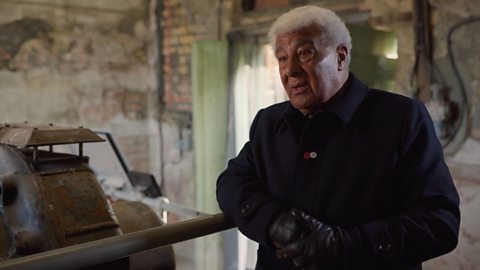
Christina Shingler - Becoming an author of children's literature. video
In this short film Felix, aged 10, talks to his grandmother Christina (Tina) Shingler, a writer who decided to do something about the lack of black characters in British literature.
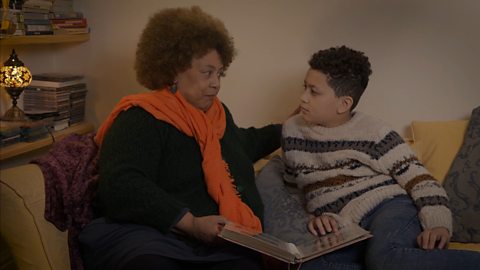
David Mwanaka - Becoming a farmer in Britain. video
In this short film 11-year-old Anashe meets David Mwanaka, and finds out about his journey from Zimbabwe to becoming a farmer in Britain.
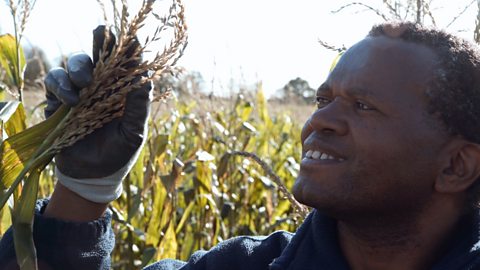
Dennis Morris - Becoming a photographer. video
This short film tells the story of Dennis Morris, a well-known photographer from London, originally from Jamaica, who photographed famous musicians including Bob Marley.
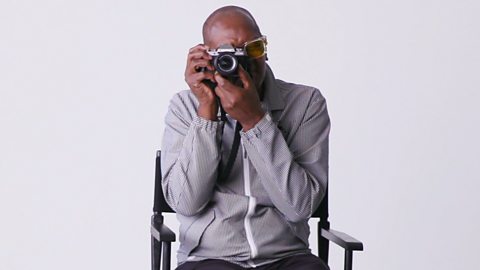
Elsie Owusu - Becoming an architect in Britain. video
In this short film 11-year-old Kendra meets Elsie Owusu, who moved from Ghana to the UK as a child and became an architect, and dealt with the challenges of working in a white, male-dominated profession.
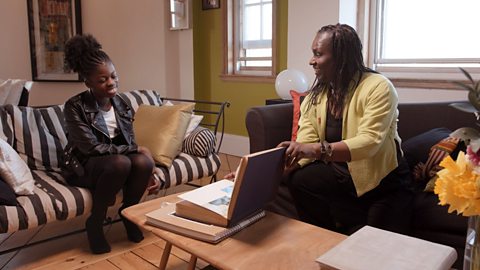
Eunice Olumide - Breaking into the fashion business. video
In this short film 12-year-old Lore meets Eunice Olumide, a second generation Nigerian who was born and grew up in Scotland and become a professional model.

Magid Magid - Becoming the youngest ever Lord Mayor of Sheffield. video
In this short film 14-year-old Abdirahman meets Magid Magid, a Somali-British activist and politician who served as the youngest ever Lord Mayor of Sheffield from May 2018 - May 2019.
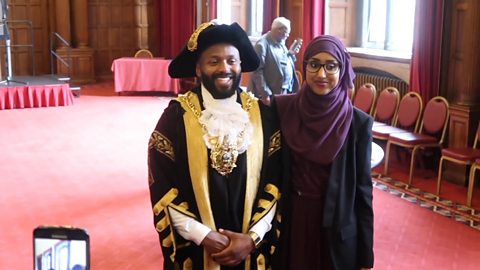
Vernon Samuels - The Bristol Bus Boycott of 1963. video
In this short film 13-year-old Amelia and Vernon Samuels, who represented Great Britain in the 1988 Olympics, tell the story of the Bristol Bus Boycott and Vernon's father, who was the first black bus driver in Bristol.
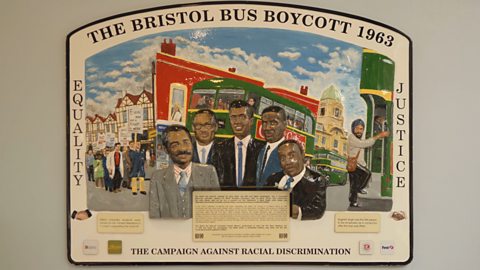
Yesha Townsend - A Bermudian poet in London. video
This short film tells the story of Yesha Townsend, a Bermudian poet who currently lives and works in London, and how she has been influenced by Mary Prince, a black woman who escaped from slavery.
